FarmaTrust is poised to revolutionize the pharmaceutical sector. It is using blockchain technology to drive innovation that effectively coordinates data protocols for improved tracking, reporting, and the saving of lives. Blockchains compile digital ledgers which manifest as distributed databases able to solve the problems that resulted from the widespread adoption of the Internet. FarmaTrust’s blockchain is an immutable ledger that stores supply chain information for the pharmaceutical industry. It is a full-cycle solution that begins at the manufacturer and culminates with delivery to end consumers.

image is adapted from FarmaTrust website (video) and whitepaper
Raja Sharif, CEO of FarmaTrust, discussed trust and innovation in an interview about saving lives using blockchain technology. The focus is on what is going on now in the life-cycle of supply chains. Transparency, security, logistics, and “fake” drug-associated deaths are all among the topics discussed. He calls attention to the higher margins and perceptions involved in the back-channel selling of manufactured drugs like Viagra versus those of homemade Ecstasy. Raja Sharif is a strong believer in the powerful potential of blockchains to transform pharmaceutical supply chains. The interview can be viewed below.
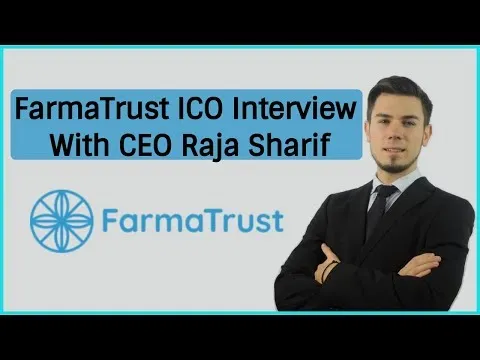
Blockchain’s Potential in the Pharmaceutical Sector
Blockchains seem to have been made specifically for the pharmaceutical industry. Data reliant industries are facing information requirements at alarming growth rates. In any regard, companies in the pharmaceutical sector rely heavily on data. They need the newest and best solutions available. Right now the opportunity exists to transform the industry by implementing the decentralization of information on an immutable ledger. FarmaTrust is leading the innovation and already forming partnerships with the Mongolian government and Gaco Pharmaceuticals.
The transformation involves automating and securing transactions while simultaneously scaling the supply chain. Permission-based digital networks require real people to validate connections. Live supervision of permission systems is needed, because of the varying control exerted by third parties over different stages of the supply chain. This limits the automation of non-blockchain systems. Additionally, security becomes a more convoluted process as intangible human factors, like new partners, are added to scaling systems of a supply chain.
Automation
Existing supply chains need a coordinated effort to improve data communication. The Zoi Supply Chain Information Exchange platform is a neutral network with the interoperability to connect synchronous and asynchronous data of various organizations. Specifically, it can automate payments, reports, and audits. The system is designed to be in continuous development through the incorporation of customization in its intelligent tools.
Security
But what kind of solution would this be if it were not extremely secure or made available for consumers to view? As blockchains grow, they become more secure. Altering these innovative digital ledgers becomes more difficult with each successive block that is added to the chain. Unlike successful hacks that alter part of a database, the distributed FarmaTrust blockchain can draw red flags from anywhere and everywhere on its peer network.
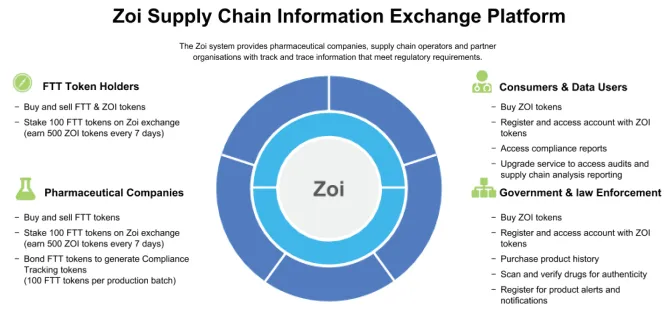
image is adapted from FarmaTrust whitepaper
Scaling
Blockchains were created with scalability in mind. Merely providing uniform access gives blockchains scaling advantages over collective permission-based systems that are commonly used in supply chains today. Much of the negative press surrounding blockchain scalability stems from disagreements among developers. How can anyone be expected to seamlessly predict the applications of a new innovation let alone a whole emerging industry?
Unlike original blockchain developers, FarmaTrust is focused on one industry that has an existing supply chain. It uses a variety of distinct transactions to handle millions of transactions. The pharmaceutical industry now has a dedicated solution to problems it had previously deemed impossible of significant mitigation.
Incentive-Based System
Two tokens run the FarmaTrust system. FTT tokens are exchangeable and can be staked to receive ZOI tokens. Each staked batch of 100 FTT yields 500 Zoi tokens every 7 days. Zoi tokens can then be used to interact with the Zoi platform. While Zoi tokens are for use on the platform alone, they can be traded on the FarmaTrust Zoi Exchange
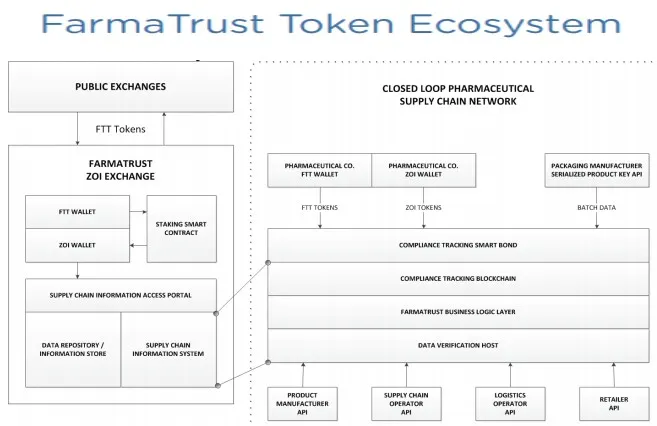
image is adapted from FarmaTrust website and whitepaper
Advantages of the FarmaTrust System
FarmaTrust brings the advantages of the blockchain to all the parties involved in pharmaceutical supply chains. It incorporates existing platforms into a more efficient and cost-effective solution. Blockchain technology is already pioneering isolated industries throughout the world. However, applying it to the pharmaceutical sector would have a major impact on the whole of society.
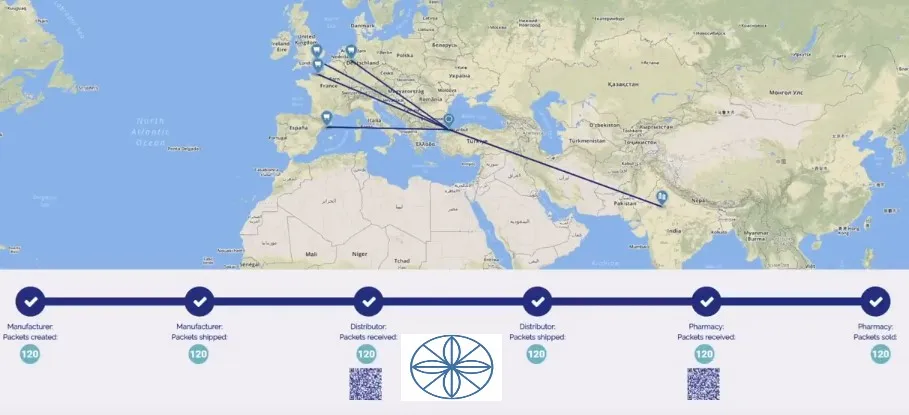
image is adapted from the front-end demo video and FarmaTrust's whitepaper
Data Tracking benefits Profitability and Authentication
One of blockchain’s lesser-known advantages is its proficiency at tracking. Improved tracking can solve long-standing problems that threaten the pharmaceutical industry. As an efficient immutable ledger, a blockchain frees up processes that can increase profitability. At the same time, it enables the tracking of drugs from the beginning of the production cycle onto end consumers. Without digital ledgers, this would entail navigating the permission systems of each organization in the chain. A decentralized blockchain would provide a one-stop data solution throughout the drug development cycle including quality control, consumption, and changes to regulation. Since FarmaTrust works with existing software, it can quickly adopt these new solutions.
The end-to-end tracking of drugs is critical for a variety of reasons. Regulators have called for better traceability of prescription drugs across supply chains. The FarmaTrust system uses a
Compliant Product (CP) token to track and trace products. CP tokens can also alleviate the industry’s current logistical nightmare and add to profitability. As a multi-billion dollar industry, its processes currently require the highest level of supervision. From irresponsible quality control to outright fraud, the pharmaceutical industry is threatened from all angles. Drug alterations, new delivery methods, equipment innovation, and changes to regulation can all affect the stated contents on products that consumers come to trust. The FarmaTrust system offers the best solution for ensuring transactions over the supply chain.
A Solution for Counterfeit Drugs
Counterfeit drugs are an external attack on the industry that, by some estimates, lead to a million deaths annually. After physicians tend to patients, companies deliver their product, and regulators have done their jobs, it is up to consumers to know if they have received the actual medication that was prescribed to them. FarmaTrust’s blockchain offers end consumers a database to verify the drug they are holding in their hand. They no longer need to rely on a busy local pharmacist to check a third-party computer system. Instead, all parties, even the end consumer, will have access to the same distributed database that is used for every step of the supply chain.
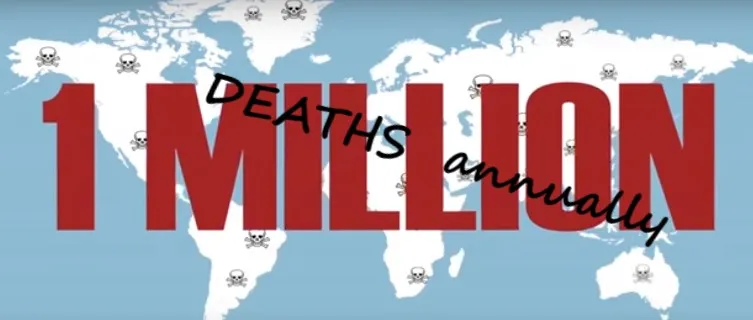
image is altered from the FarmaTrust website (video)
Zoi System: A Revolutionary Approach for Pharmaceutical Supply Chains
The live demo of FarmaTrust’s front-end Zoi system takes a look at the journey across the supply chain. It details how data packets mark transactions for the manufacturer, distributor, pharmacy, and end consumers. The live demo can be viewed below.

The FarmaTrust blockchain is made available to all parties involved in the supply chain, including pharmaceutical companies. An end consumer does not just verify their product with an authority. They can track every packet that is formed for each transaction on a drug’s journey. This is possible because each step is recorded and every packet is identifiable on an immutable ledger. Customized dashboards facilitate the management of real-time tracking and ownership. This includes QR codes that verify shipping receipts. It becomes quickly apparent that connecting to the Zoi platform promotes efficiency, security, and reassurance.
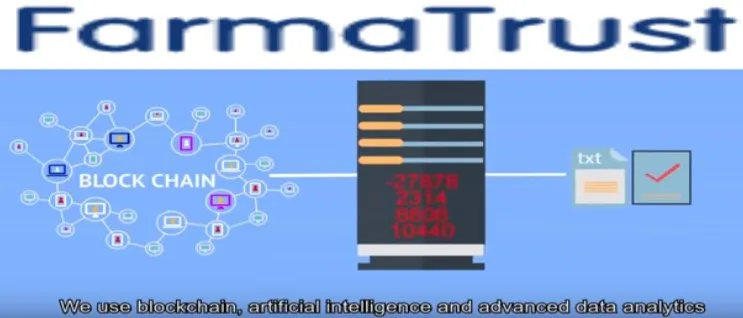
image is adapted from FarmaTrust website and its video
There is more that the Zoi system can do. The embedded artificial intelligence facilitates integration with logistics companies. This helps to optimize shipping and asset distribution over the supply chain. Zoi also has the capability of accommodating a wide range of management systems. Its data sharing capabilities minimize the costs associated with regulation and those passed along to consumers. Plans for AI include services aided by machine learning and predictive information. In the end, all of these aspects help to reassure consumers that their prescribed medicine is verifiable, safe, and secure with the simplicity of monitoring through a mobile app.
The FarmaTrust white paper is available for a deeper examination. Its ICO is slated for June 1, 2018. For further updates check out the contest hosted by @OriginalWorks.
farma2018